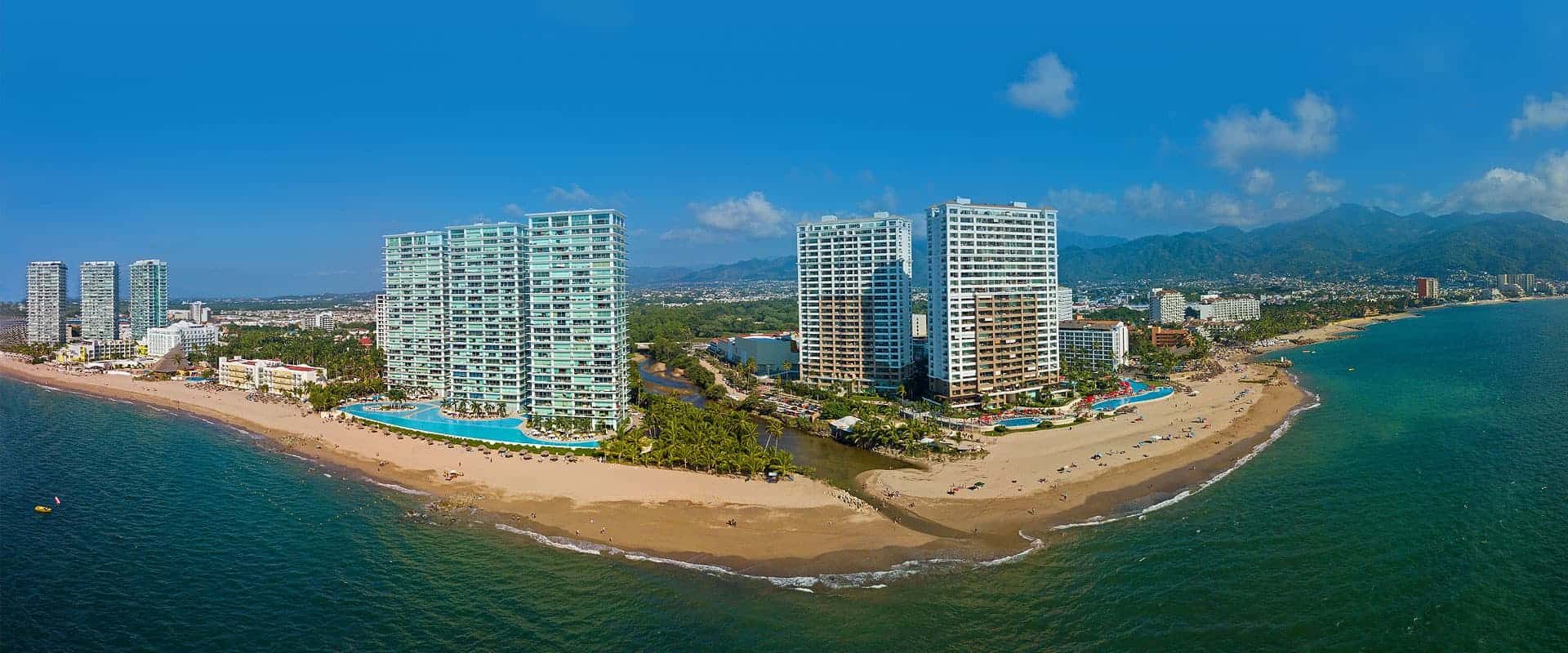Buying “Pre-Sale” Properties in Vallarta
by David Connell

"Pre-sale" purchases
A "pre-sale" purchase exists when a buyer enters into an agreement with a developer to purchase a unit that has not yet been built or finished. This type of purchase is inherently risky. In Mexico over the last 10 years the real estate market has seen a major boom, especially in developed or developing coastal areas. Between 1995 and 2005 prices skyrocketed and fueled an increased number of new projects, the majority of which were sold as "pre-sales". The first of these projects brought great returns to the buyers, who often times purchased at a 30% discount off the finished sales price. Furthermore, many of these projects went up in value 20 or 30% per year prior to being delivered, which made the investment even more profitable.
When the real estate boom started many investors thought long and hard about the terms of the pre-sale agreement before signing. Many did not sign these agreements as they presented too much risk and were too favorable to the developer. In short there was no guarantee a developer would finish a project or return the buyers' funds if they could not deliver.
However, as the boom gained speed, people were more willing to accept a less protective agreement in order to secure deals and get in on the "great investment opportunity". As the real estate boom continued, fewer and fewer people were concerned about the terms of the agreements they were signing and more were concerned with signing quickly so they would not lose the unit to another buyer.
The recent downturn in the world economy and the roller coaster stock market have seriously changed the outlook of every single buyer I have spoken with who is currently holding a signed agreement with a pre-sale project that has not yet been delivered . Just about every buyer that I speak with today who has invested in a pre-sale project that is not finished is asking me "Is the developer going to finish the project?", "Can I get my money back?" and "How can I protect myself if the project fails?" This article will go over where the pre-sale market is today, the risks of investing, and what you can do to limit those risks.
First and foremost, everyone must understand and have in mind that developers, more than anyone else, want to finish their projects and deliver the units. An unfinished, undelivered project means losses and no developer is in business to lose money. In most cases developers are the ones that have put up the initial millions of dollars in seed money to get the project going. Do "pre-sale" developers use your money to finance the projects? The answer is yes, they do use pre-sale money to finance or leverage their projects. However, everyone must also understand that in most cases they have put up hundreds of thousands of dollars, if not millions to get the project going.
This article will look at:
- The general types of "pre-sale" projects that exist
- What you should negotiate for
- What happens if the developer disappears and no one is on the project
Types of "Pre-sale" Projects
There are principally two types of "pre-sale" projects. Please understand that there are many variations of the two principal types, but they all seem to fall into one of the two following classes:
Class One: Financed Pre-Sale Projects
These projects are financed by banks or private equity groups who fund the project "based on sales projections being met". As a very general example, a developer will put up 20% of the initial funds to get the project moving, then as certain numbers of sales are made, the bank or private equity group will release funds to the project to move it forward. Based on an "absorption rate" (in general a speculative number of sales per month or quarter), the lender will release more funds to advance the project along. Obviously the "first round" of financing is usually the most difficult to get as the bank wants to see a "healthy" absorption of the product into the market. If they can see that 30% of total sales are reached, they are usually willing to release that really important first round of financing to get the project off the ground.
If you pick up a real estate magazine from a year ago you will see several advertised projects that no longer exist. Why? Because they did not get enough "absorption sales" to kick off their first round of financing.
Most of these Financed Pre-Sale Projects are the bigger, more well-known outfits. These outfits are usually better prepared to deal with problems in the market, but they are not completely immune to sharp downturns in the number of sales. So where do the risks lie in these projects? Principally they lie in the developer making initial sales projections to get first round of financing approved but then not making further benchmark "absorption sales" to get the second and third round of financing. Recently some developments are experiencing very low sales numbers and what is worse, they are having clients default on existing agreements, lowering their number of sales to below the minimum required for financing to be in place. If this happens the developers usually opt to do all or some of the following:
Ask for advanced or final payments. Most pre-sale agreements are very one-sided in favor of the developer and contain language that allows the developer to ask for final payment before delivering the product.
Slow the construction down to the bare minimum. This is to cut costs until cash flow increases or sales number are met, triggering the next round of financing.
Extend financing terms and sometimes pass them on to the buyers.
All of these options mean that you are going to be asked to pay more for your unit or it is going to be delivered later. The developer is looking at the economics of the project. You also need to be looking at this.
If you have invested in this type of pre-sale project and see the developer slowing down on construction or proposing any of the options above, you need to move as quickly as possible to renegotiate or force a settlement on your agreement. The first people to negotiate or force a deal will usually get a better deal than those who wait.
Class Two: Non-Financed “Pre-sale” Projects
These are the projects that do not have any type of formal financing and are speculating on making enough sales to generate cash flow for construction costs. These are usually smaller projects.
Needless to say, these types of project are higher risk projects because when the sales stop, so does the project. If the sales stop for any length of time, these projects are more susceptible to legal action and to having the developer "disappear". Once the developer disappears, everyone loses.
Furthermore since a financial institution or bank is not involved, there is usually no "contingency" or risk plan established in case the project fails. When a bank loans money to a project, they almost always include provisions to take over the project in the case of failure as well as a plan to inject the necessary capital to finalize the project. Smaller, self financed projects do not have these contingency plans.
In these smaller types of "Pre-sale" projects, if sales are not met usually one of two things happens:
Construction comes to a virtual halt. Maybe a handful of workers are kept on to maintain the appearance of progress, but for all intents and purposes the project is stopped.
The developer asks for advance payment or increases the price of the units.
Smaller projects are more susceptible to going under. It is extremely important to be aware of this and, if any of the warning signs mentioned above appear, to take immediate action to protect your investment. Action, in this case, would mean getting a written and notarized agreement from the developer as well as full disclosure on the finances of the project. Legal action may also be needed. Verbal agreements or promises mean absolutely nothing unless the person making them is willing to sign off on them.
What should you negotiate for?
If you can, you need to turn the emotions completely off and the math skills on. There is a whole range of questions that need to be answered in order to find the mathematical and economic solution that is best for you. Some of the general questions we go over with our clients are:
- What is the developer offering? Any offer the developer is giving is a starting point. You need to build your arguments around this starting point.
- What percentage of the total price have you paid? This is the liability of the developer as well as your exposure.
- What are you willing to lose? This is a hard question but you have to understand that if you are not flexible, your ability to reach a negotiated resolution is not good, and litigation is expensive.
- What legal options do you have and what are they going to cost? There are legal options besides litigation which can force a developer to come to a more reasonable solution. All of these options need to be explored.
How much more would you be willing to pay to have a finished unit vs. litigation?
Is there a group that has a professional common representative? The developer wants to resolve as many problems as he can. Groups of buyers will get priority attention over individual owners.
We must understand that a developer is in an economic bind if he is slowing down or stopping the project. His options are limited and he will do whatever he needs to in order to make the project not fail and avoid a lawsuit. The developer is not your friend nor is he your enemy. You are both investors in a project that is in trouble due to a world economic crisis. Finding or forcing a solution is better for both parties so you need to work with the developer or force him to work with you.
What if the developer is gone and no one is on the project?
This is the worst case scenario, and you need to do some immediate research on what happened too see if there are any groups working to negotiate, find the developer, or file action against the developer. Do not walk away from your investment. Even if you only recuperate 30% of what you invested, it is better than walking away and allowing someone else to take all of your investment. Get good advice, talk to other people in the development, review your options, and get moving to protect your investment.
David Connell is a licensed Mexican attorney with an office in Puerto Vallarta. If you have any questions about this process, you can contact his office at: www.mexicolaw.com.mx.


